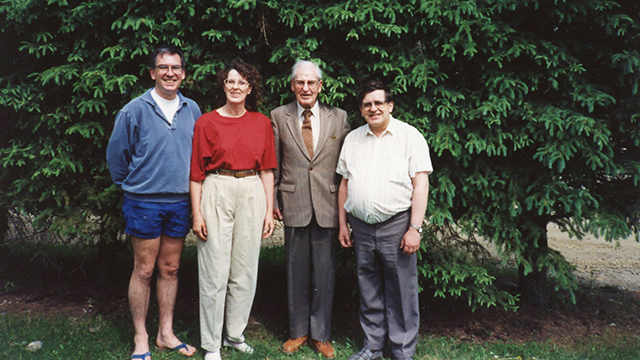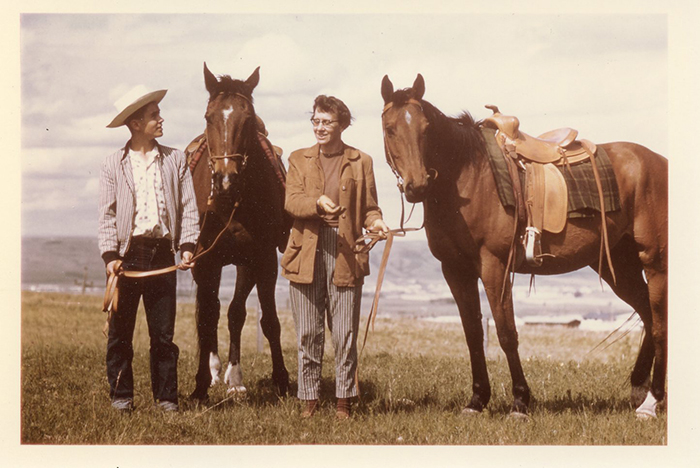
A pilot program made possible thanks to the Douglas Harding Trust supports patients with mental illness. Pictured: Douglas Harding, his father Stanley RL Harding, his sister Margaret Shone and brother Richard Harding in 1992. Photo provided by the Harding family.
For patients experiencing mental illness and their families, being discharged from the hospital back into the community can be a difficult transition. In Alberta, only 50 per cent of patients who leave the hospital attend their follow-up appointments, which can lead to them being readmitted to hospital.
A new pilot program will help to bridge this gap by providing patients with a peer support worker to help them navigate the health care and related support systems. The pilot program was made possible thanks to support from the Douglas Harding Trust and the Harding family.
"The Harding family's contribution makes this whole project possible, without them the pilot project wouldn't exist," said psychiatrist Vincent Agyapong, the study lead and an associate clinical professor at the University of Alberta's Faculty of Medicine & Dentistry.
The Douglas Harding Trust was created by Douglas's mother to assist with his expenses when he was living in the community. As a young man, Douglas was diagnosed with schizophrenia and as a result spent a lot of his adult life in care. When he died in 2012, the trust was to be donated.
Margaret Shone, Douglas's sister, describes her brother as an active, kind person with a gentle but wryly clever sense of humour.
"Doug was a gifted and promising young man. His prolonged suffering with schizophrenia robbed him of the opportunity to live his potential," said Shone. "This was not only his loss, but also our loss as a family who loved him and society's loss of what he would have contributed but for the illness."
Shone says Alberta Health Services supported the project, which was important. The pilot program is meant to address an issue familiar to the family. Shone recalls that during Douglas's life, there were often issues around what happened when he was discharged from the hospital into the community.
"In the early years, a discharge was a discharge and that was it. In later years things were starting to happen in the mental health community, and there would be more planning around the discharge," said Shone. "But there is still certainly room to improve."
Another factor in choosing to give to the University of Alberta was Shone's personal connection. She spent her professional career on campus as counsel to the Alberta Law Reform Institute.
"I have great respect for doctors in the Department of Psychiatry, a number of whom I met and some of whom I collaborated with during several years advocating on mental health issues," said Shone.

Douglas Harding with his mother Jean Coutts Harding in the early 1960s.
The Peer Support System
Agyapong believes that peer support may be the missing link for mental health care in the community.
"I have had experiences where I have prescribed a patient medication, and they ask me if I have taken the drug before and I say no. Doctor's don't have the same lived experience," said Agyapong. "The peer support worker has gone through it and has a better understanding."
The pilot project will evaluate the newly established Edmonton Peer Support Project. The study will determine if peer support workers can play a significant role in terms of supporting patients that have been discharged from acute care into the community and helping them to navigate community services.
Patients with a chronic and enduring mental health condition such as a mood disorder or psychosis will be eligible for the program.
In the past, there has been a high attrition rate for peer support workers in Alberta, but Agyapong hopes that the new peer recognition support system will encourage peer support workers to stay in the program.
The patients who are being provided with peer support services will also be associates of the system. The expectation is that when they are stable and peer support roles become vacant, they can apply to become peer support workers as well.
Agyapong believes that since the peer has been able to overcome similar challenges, they will be a trusted source of support and better able to relate to the patient.
The study will compare four groups of patients. One group will receive a peer support worker in combination with supportive text messages, one will receive a peer support worker, one will receive supportive texts only, and the fourth will receive what is available currently.
Agyapong's team will follow up after six and 12 months.
"I am hopeful that these interventions will be beneficial for patients and will help with engagement in therapy and compliance with medication, because patients will have support from a peer," said Agyapong.
He expects relapse rates to reduce because if patients are compliant with their treatment, they are less likely to relapse and go back into the hospital.
In addition to the support for patients, each peer support worker will be assigned a mental health worker for supervision and support.
Agyapong will also be measuring the impact of the peer support system on families.
"Mental health impacts the entire family, there is a constant worry that can affect all aspects of life," said Agyapong. "Mental illness is often a lifelong disease, so families need to be supported."
He says receiving support for this project from the Harding family is even more meaningful.
"This is a family who has actually experienced this; their donation is going to make the lives of people better. And not just the people experiencing mental health issues, but their families as well," said Agyapong. "In affect the Harding family is being a peer support to families of patients who will benefit from this program. The impact of this is extensive."